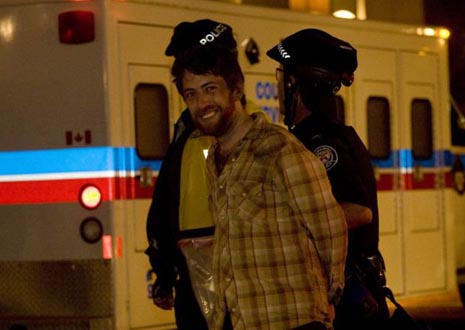In the fallout of the inaugural handover of global economic dominance from the G8 to the G20, the news has been about the police clashes on the streets of Toronto, followed by a secondary, disconnected story about the decisions of the meetings.
The new enforced consensus of yet another round of brutal structural adjustment programs has been disconnected from the tent cities, repressive police violence, burning police cars and smashed corporate chains surrounding the summit. However, the reality of the clash in the heart Canada’s financial capital — from its streets to its inhumane, makeshift jails for global justice activists — is that people fighting to determine their own economic future clashed head on with the plans of the G20.
In the week leading up to the G20 meetings, culminating in the weekend clash, a loose network of local anti-poverty activists, anti-mining campaigners, and frustrated unions, environmental and indigenous activist emerged calling for democratic economic control.
“We are calling for the right of effected communities to say no to mining development and controlled their own resources,” anti-corporate mining activist Sakura Saunders told me in a march around the institutions of economic dominance titled “Toxic tour.”
Those calls jelled well with local anti-poverty activists who set up a tent city in Toronto’s downtown to demand universal housing rights against the backdrop of the banking and housing collapse. And, after having members on strike for nearly a year, unions like The United Steel Workers were in the fray, calling for a redistribution of economic power. “We are working with our sisters and brothers in the labor struggles around the world to demand fair deals, public control and green jobs,” Carolyn Egan, a feminist and labour activist with the United Steel Workers, told me marching in front of a boisterous crowd of Canadian syndicalists.
As these demands gained forceful momentum and the protests eclipsed the meetings, Toronto turned into a flashpoint of the global clash over our economic future. Police forces violently stepped in to re-impose calm compliance on the streets of one of the worlds the wealthiest cities, with an overwhelming security presence. The people discussing global alternatives through chants and direct actions in the streets were beaten and jailed by police using preemptive arrests of demonstration organizers and mass arrests of participants to restore the eerie calm of a one-sided debate.
Indeed, the impatience towards an imposed economic system by the world’s 20 most powerful political elites was taken out by some on the store fronts of the corporations that reinforce the centralized power of the G20. Meanwhile — inside the jails — the police mimicked the isolation and repression of the global economic agenda, leaving people battered, violated and traumatized along, gender, race, sexuality and class lines.
In an old film studio in Toronto’s east side, those that came out to demand an equal right to participate and shape social development were first segregated by gender and thrown into overcrowded steal cages where they were left in handcuffs. Those most severely beaten in the cells were people of color, while reports of police threatening sexual violence — including rape against women, and homophobic violence towards sexual minorities — emerged. As people were release from jail, word started to get out about traumatized women picked up in the protests who were strip-searched by male officers.
Inside the men’s section of the jails, steal cage cells of 8-ft by 5-ft with cold concrete floors and nothing else would hold up to six people. Water and food were scarce, basic human rights were denied and ignored by the police, while demands for medical attention for those who had been battered or had medical conditions were systematically looked over.
Now that the spectacle is wrapped up, privatization and downsizing put again into action and protesters still in jail in Toronto, the cold reality of the G20 meetings is a renewed commitment to building an economy that reflects the brutality of Toronto’s G20 jails.
Jesse Rosenfeld is a freelance journalist based out of Ramallah and Tel Aviv-Jaffa since 2007. Originally from Toronto, he was covering the demonstrations against the G-8 and G-20 for the Guardian’s Comment is Free section and theAlternative Media Center when he was beaten and arrested. He is also the editor of The Daily Nuisance.




